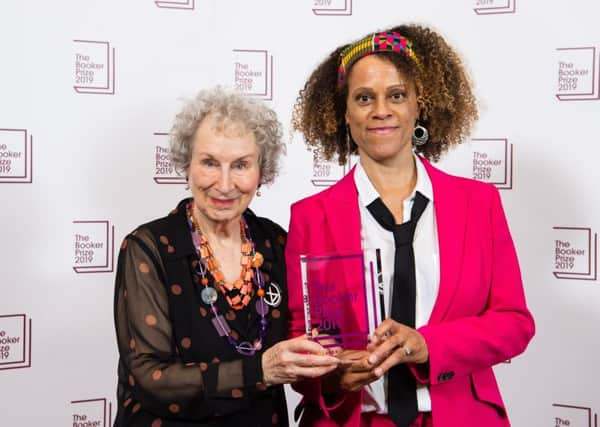“2019 has not been a year in which the literary world covered itself in glory” - Stuart Kelly on the year in books


This has not been, I am afraid, a year in which the literary world covered itself in glory. Or rather, there was a bit too much glory going around. The Booker Prize went to Bernardine Evaristo for Girl, Woman, Other and to Margaret Atwood for The Testaments. As a former judge, I can assure you we were told in no uncertain terms that there was to be one and only one winner. (This came in after 1992, when Michael Ondaatje and Barry Unsworth split the prize). To add more consternation, one of the judges said that Atwood’s “titanic career” was part of the decision. Again, we were sternly told that it was not a Lifetime Achievement Award and it was the book and nothing but the book that was being judged. My sympathies lie with Evaristo and Atwood (who has, let us not forget, won it before). Neither feels they really won. I suppose one could be “Boo” and the other “Ker”.
Not to be outdone, the Nobel Prize for literature was awarded twice. Last year no award was made (the year before it inexplicably went to Bob Dylan) because of a torrent of resignations, leaving the Academy inquorate, following allegations of sexual misconduct and corruption on the part of the husband of one of “The Eighteen” academicians. So the 2018 prize was awarded in 2019 to the Polish writer, Olga Tokarczuk, and the 2019 prize to the Austrian Peter Handke. This was perhaps not the most PR-savvy idea, given that Handke claimed Serbia was a victim in the Yugoslav War, and went on to make a speech at the funeral of Slobodan Milošević. Judge me on my work, he retorted. This was also supposed to be the year when the Nobel was less Eurocentric.
Advertisement
Hide AdLooking back over the year is always a slightly melancholy affair, but it is at least gladdened by my being able to highlight some of the titles I didn’t get a chance to review.
One of my unreviewed highlights of the year was Jonathan Lethem’s The Feral Detective. Lethem has, as it were, form in this genre: a sort of psychedelic detective story. In this novel, we meet Heist, a rather taciturn detective hired by Phoebe, a journalist, to find her friend’s missing daughter. The crackling wit it there from the outset. “The story does involve a missing person, and it could well be me,” we are told. It spirals out into desert tribes, locked in conflict, who have a strange connection to Heist. Almost every page has a zinger. I particularly liked, early on, Phoebe’s disdain for “the men who refused me the chance to refuse to marry them by refusing to ask”.
If Trump has one legacy, it will be the Swift-like indignation at his time in office. It is there in Lucy Ellmann’s Ducks, Newburyport, which was shortlisted for the Booker (it would have won had I been a judge) and then did win the Goldsmith’s Prize (which is increasingly the prize I watch most keenly, not least because they tend to choose books I admire). There were a lot of blatherations about it being a “difficult” novel. It is long – 998 pages plus a glossary – and it is almost entirely without full stops. That is not to say that it is without punctuation. There are commas, ellipsis breaks and a tolling refrain, “The fact that”, which sounds over an Ohio woman’s unspooling consciousness as she bakes pies, makes lists, thinks about almost everything and reminisces about near-death. Too many critics said it was like Joyce’s Ulysses, probably because Ellmann’s father wrote a biography of Joyce, when the more apt comparison was the under-rated American modernist, Gertrude Stein, particularly in The Making Of Americans. Ellmann has always been a barbed author, and here, although there are plenty of fletches nocked, there is also the strangest kind of optimism. Right at the start we have the words “too brave to despair”. Minatory words indeed.
In non-fiction, I spent well over a month with John Barton’s A History Of The Bible: The Book And Its Faiths as my bedside book. Regular readers may not know that I moonlight leading worship for churches without a minister. This is a dense, compelling and endlessly intriguing book, which courageously looks at the problems of variants, apocrypha, questions of translation and very much more. It should be in the armoury of anyone, whether believer or not. It is a very good book about the Good Book, and reminds us that our understanding is often based on tradition and not exceptional scholarship.
I don’t know if I would call Erika Fatland’s Sovietistan a comedy, but there is a certain grim incredulity in her travels through the countries that once made up the USSR. Another brilliant oddity was Suzanne Fagence Cooper’s To See Clearly: Why Ruskin Matters. Thematically discussing various aspects of the great Victorian sage John Ruskin’s thinking, it also transforms into an affecting account of what it must be like to have a great mind, great enough to realise its own disintegration. Despite some rather dubious decisions, there have been many, many books this year that I will re-read. Eventually.